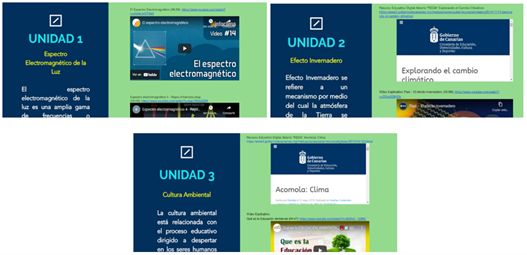Digital Educational Resource to Understand the Relationship Between Solar Rays and the Greenhouse Effect
DOI:
https://doi.org/10.55996/dekape.v2i2.282Keywords:
Climate change, educational innovation, educational technology, environmental education, teaching materialsAbstract
The objective of this research is to design and implement a Digital Educational Resource to understand the relationship between Solar Rays and the Greenhouse Effect with middle school students of the Distrital Educational Institution Costa Caribe, Barranquilla, Colombia. The research is framed litina the mixed approach and will have a descriptive scope, since it intends to strengthen subjective and inter subjective realities of the target population working with a sample of 66 students. As results it was found that a high percentage of students do not know and have not explored the technological educational tools, there is a high lack of knowledge of what climate change means, however they express positions in favor of environmental care; this strategy allowed students to generate alternatives that can be taken to improve the environment, critical thinking in addition to introducing students to the knowledge of Digital Educational Resources which proved to be highly motivating in their learning.
Downloads
References
Alcaldía de Barranquilla. (2025). Barranquilla, ejemplo de formación ambiental para los ciudadanos. https://barranquilla.gov.co/gerencia-ciudad/barranquilla-ejemplo-de-formacion-ambiental-para-los-ciudadanos
Anguita Acero, J. M., Méndez Coca, M., & Méndez Coca, D. (2020). Motivación de alumnos de Educación Secundaria y Bachillerato hacia el uso de recursos digitales durante la crisis del Covid-19. Revista de Estilos de Aprendizaje, 13(Especial), 68–81. https://doi.org/10.55777/rea.v13iEspecial.2242
Asociación Colombiana de Ciudades Capitales. (2023). Con educación ambiental, desde los colegios oficiales de Barranquilla también se construye ‘Biodiverciudad.’ https://www.asocapitales.co/2023/05/con-educacion-ambiental-desde-los-colegios-oficiales-de-barranquilla-tambien-se-construye-biodiverciudad/
Bolaños, O. E. (2020). Constructivism: Pedagogical Model for the Teaching of Mathematics. Revista Educare, 24(3), 488–502. https://revistas.investigacion-upelipb.com/index.php/educare/article/view/1413/1359
Calderón Torres, S. S., & Caicedo Rincón, C. del P. (2019). Educación Ambiental: Aspectos relevantes de sus antecedentes y conceptos. Ingeniería y Región, 22, 14–27. https://doi.org/10.25054/22161325.2565
Cho, Y., & Park, K. S. (2023). Designing Immersive Virtual Reality Simulation for Environmental Science Education. Electronics (Switzerland), 12(2). https://doi.org/10.3390/electronics12020315
Gutierrez-Sabogal, L. H. (2016). Problemática de la educación ambiental en las instituciones educativas -Problematic of the Environmental Education in Educational Institutions. Revista Científica, 3(23), 57. https://doi.org/10.14483/udistrital.jour.RC.2015.23.a5
Hamui-Sutton, A. (2017). Investigación en educación médica. Investigación En Educación Médica, 2(8), 211–216. http://www.scielo.org.mx/scielo.php?script=sci_arttext&pid=S2007-50572013000400006&lng=es&nrm=iso&tlng=%0Ahttp://www.scielo.org.mx/scielo.php?pid=S2007-50572013000400006&script=sci_arttext&tlng=pt
Hernández Sampieri, R., Fernandez Collado, C., & Baptisa Lucio, P. (2014). Metodología de la Investigación.
Ministerio de Educación. (2016). Derechos básicos de aprendizaje. https://www.colombiaaprende.edu.co/sites/default/files/files_public/2022-06/DBA_C.Naturales-min.pdf
Ministerio de Educación Nacional. (2022). Ecosistema nacional de innovación educativa y transformación digital.
Montero, I., & León, O. G. (2002). Clasificación y descripción de las metodologías de investigación en Psicología. Revista Internacional de Psicología Clinica y La Salud, 2, 503–508.
Mora Casasola, M. F. (2023). Implementación de recursos educativos digitales, una revisión sistemática desde la enseñanza del Cálculo Diferencial. Revista Digital: Matemática, Educación e Internet, 24(1). https://doi.org/10.18845/rdmei.v24i1.6709
Moreno Castillo, W. E., Muñoz Espinoza, M. S., & Paredes Ojeda, E. J. (2025). Producción de Biogás Utilizando Biomasa Residual Pecuaria con Fibra Vegetal y Enriquecida con Lactosuero como Alternativa para Mitigar los Gases de Efecto Invernadero. Ciencia Latina Revista Científica Multidisciplinar, 9(1), 7994–8010. https://doi.org/10.37811/cl_rcm.v9i1.16452
Ñaupas Paitán, H., Valdivia Dueñas, M. R., Palacios Vilela, J. J., & Romero Delgado, H. E. (2018). Metodología de la investigación. Journal of Chemical Information and Modeling, 53(9), 1689–1699. https://edicionesdelau.com/wp-content/uploads/2018/09/Anexos-Metodologia_Ñaupas_5aEd.pdf
Orizaola, M. (2017). Una Visión Global Del Efecto Invernadero. Universidad de Cantabria, 33. https://repositorio.unican.es/xmlui/bitstream/handle/10902/12567/OrizaolaMadrazoMiguel.pdf?sequence=1
Pardo Buendía, M. (2007). El impacto social del cambio climático. Panorama Social, 5, 22–35.
Pereda Marin, S. (1987). Psicologia Experimental. I. - Metodología. https://www.buscalibre.pe/libro-psicologia-experimental-i-metodologia/32717507/p/32717507?srsltid=AfmBOopTHAw7bnJe-X6BevnJz-3KxesmeCHZzdE6hAm8I4DofJ7TkLxd
UNESCO. (2021). La UNESCO quiere que la educación ambiental sea un componente clave de los planes de estudio para 2025. Organización de Las Naciones Unidas Para La Educación, La Ciencia y La Cultura. https://www.unesco.org/es/articles/la-unesco-quiere-que-la-educacion-ambiental-sea-un-componente-clave-de-los-planes-de-estudio-para
Vielma, E. V., & Salas, M. L. (2000). Aportes de las teorías de Vygotsky, Piaget, Bandura y Bruner. Paralelismo en sus posiciones en relación con el desarrollo. Educere, 3(1316–4910), 30–37. https://doi.org/1316-4910
Vizcaino Aponte, J. C. (2017). Estrategias con recursos educativos digitales abiertos tipo simulador y su incidencia en la motivación al logro: Aprendizaje basado en problemas frente a diseño instruccional Presentado.

Downloads
Published
How to Cite
Issue
Section
License
Copyright (c) 2025 Luz Aleida Alzate, José Gustavo González García, Zenaida Analy Domínguez Valenzuela, David Eduardo Borge Donado

This work is licensed under a Creative Commons Attribution-NonCommercial 4.0 International License.





